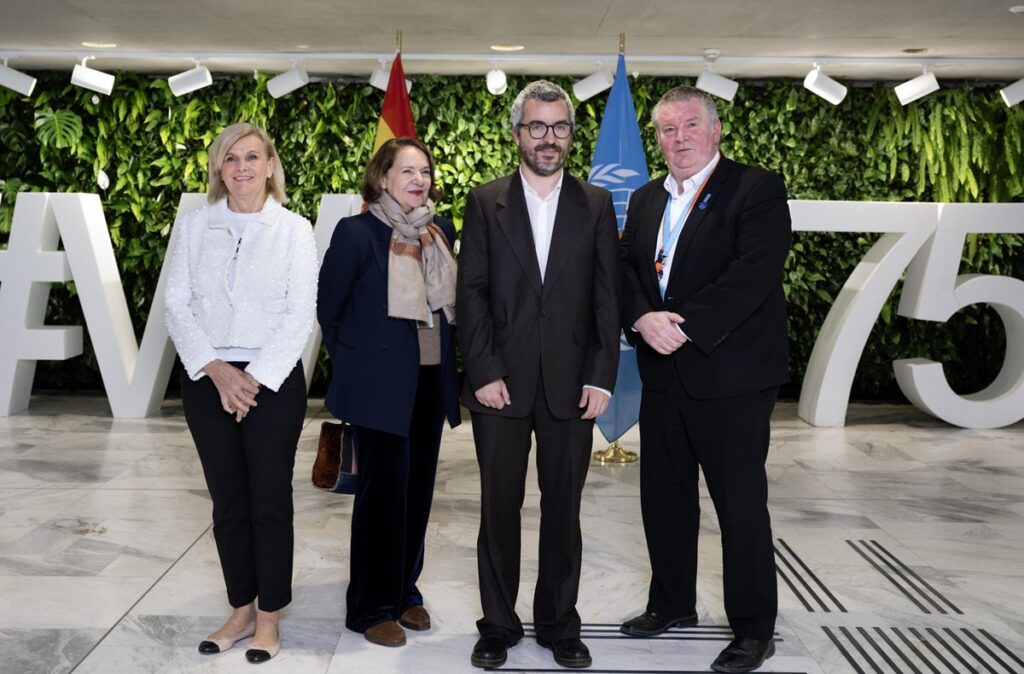On 23 and 24 April 2024, WHO welcomed Spanish Secretary of State for Health Javier Padilla Bernardes and his delegation to discuss joint global health priorities. In particular, Spain is focusing on universal health insurance and strengthening its health care system. Pandemic response and emergency medical teams. Organ and tissue transplantation. Malaria and other tropical diseases. And polio.
During the visit, participants highlighted plans and ongoing work across a number of areas, including WHO's transplant program to increase availability. Ethical access and monitoring of human cell transplantation. tissues and organs. They also discussed social determinants of health. Tobacco and alcohol control. primary health care. Access to medicines. Universal health insurance. Ensuring a healthy life for all age groups. Nutrition and food safety. Health care workers. And an emergency.
Mr. Javier Padilla was accompanied by Mr. Paola Cannata Morello (Secretary of the Cabinet of the Minister of Health), Mr. Jacobo Fernández Álvarez (Technical Secretary General), and Mr. Hector Tejero Franco (Adviser to the Cabinet of the Minister of Health and Health Affairs). did. and Climate Change, and Roberto Caro Vázquez, Senior Technician in the Office of the Secretary of Health. The delegation included representatives from the United Nations office in Geneva and other international organizations, including Ambassador A. Díaz-Lato Revuelta, Ambassador Clara Cabrera Bracero, and Counselor Maria del Carmen Martínez de la Peña. Representatives from the Spanish government delegation also participated.
The Spanish delegation included Dr. Airan Lee, Assistant Director General (ADG) for Universal Health Coverage, Healthy Population, Dr. Chatalina Böhme, ADG for External Relations and Governance, ADG for Access to Medicines and Health Products; I had a meeting with Dr. Yukiko Nakatani, ADG in charge of antibacterial care. Dr. Michael Ryan, Deputy Director-General and Director of the WHO Health and Medical Emergencies Programme, in charge of interim resistance operations;

From left to right: Dr. María Neira (Director of Environment, Climate Change and Health), Ambassador Aurora Díaz-Lato Revuelta, Dr. Javier Padilla Bernardes (Minister of Health), Michael Ryan (Deputy Director-General for Health Emergencies, WHO) and Executive Director) Program.Credit: WHO/Chris Black
WHO management and its team expressed their gratitude to Spain for its financial and technical support over the years. Spain’s assistance has helped improve access to quality essential health services and medicines over the past two years. Tackling climate change and a healthier environment. Strengthening the country's capabilities in both data and innovation. Spain remains a champion of the Global Polio Eradication Initiative.
Spain also contributes to WHO's work in tackling malaria and other neglected tropical diseases, helping WHO to improve countries' preparedness, preparedness, prevention and response to health emergencies, epidemics and pandemics. We have helped strengthen it. Spain's contribution to the WHO Health Emergency Appeal helps protect health in humanitarian emergencies to break the cycle of poverty.
As a world leader in the field of organ and tissue transplantation, Spain plays an important role in the WHO's efforts through the Ministry of Health to improve safety, quality, effectiveness and access to transplants. WHO counts Spain as a leading and sharing expertise partner in supporting countries to develop sustainable and self-sufficient organ transplant systems, but also more generally as a partner in WHO's health for all. We highly value and acknowledge that we are an important partner.


